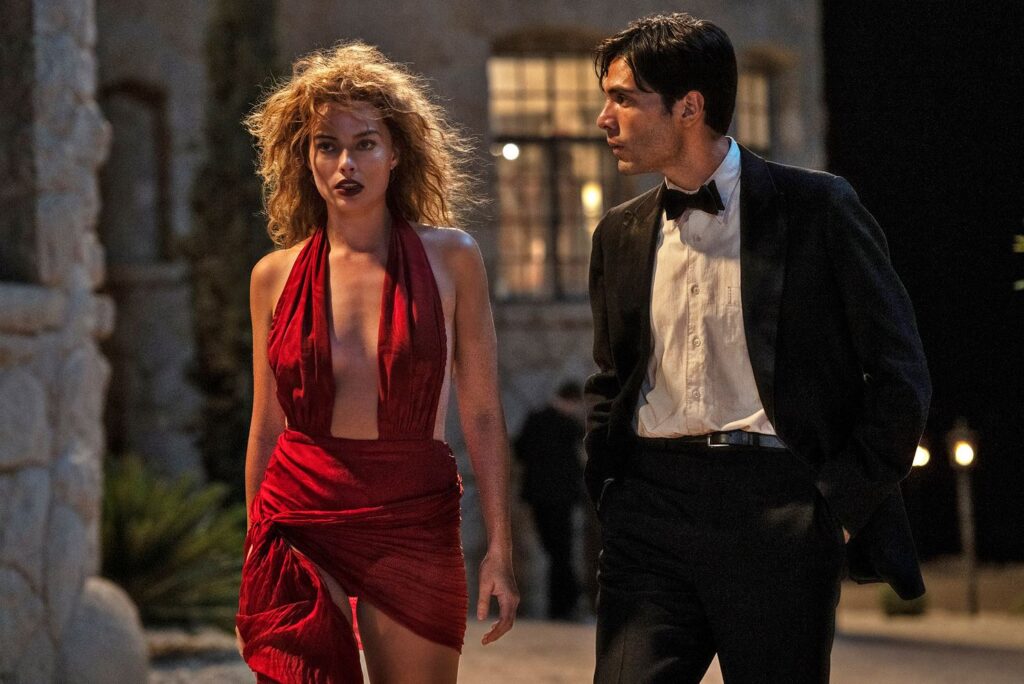
In the Bible, the city of Babylon is referred to as a dwelling place of demons—a haunted, sinful metropolis that is ultimately befallen by evil, disaster, and ruin. That Damien Chazelle has selected it as the title of his new movie, a rampaging epic set in the dawn of Hollywood, is one of the filmmaker’s subtler touches.
I mean this less as criticism than observation—maybe even admiration. The maximalism with which Chazelle has constructed Babylon, a simultaneously nostalgic and seditious homage to cinema’s golden age, is unmistakably a product of courage, even if it is also a signifier of poor taste and bad sense. His heedlessness—the way he has envisioned 1920s Tinseltown as a gluttonous underworld of sex, drugs, and generalized depravity—carries with it a monumental ambition, one that demands the skill of a truly great director. That Chazelle mostly pulls it off is a testament to his talent; that he fails in stretches makes his vanity no less interesting.
In the movie’s opening scene (which is naturally preceded by the old-timey Paramount Pictures logo), an elephant defecates profusely on a helpless stagehand, then shits again for good measure, showering the poor grunt in excrement. This isn’t the last time in the film that fluids will spew from an orifice, but while this befouling encapsulates Babylon’s penchant for vulgarity and provocation, what follows is anything but crude. Ditching the intimate, claustrophobic intensity that characterized his prior feature, First Man—which in turn was a departure from the swooning, soaring grandeur of La La Land—Chazelle here operates in a register that might be called debauched elegance. He chronicles all manner of hedonism—dancing, snorting, pissing, fucking—with supple, stylish craft. What you see isn’t so much a classic collision of beauty and brutality as a sensuous appreciation of human carnality.
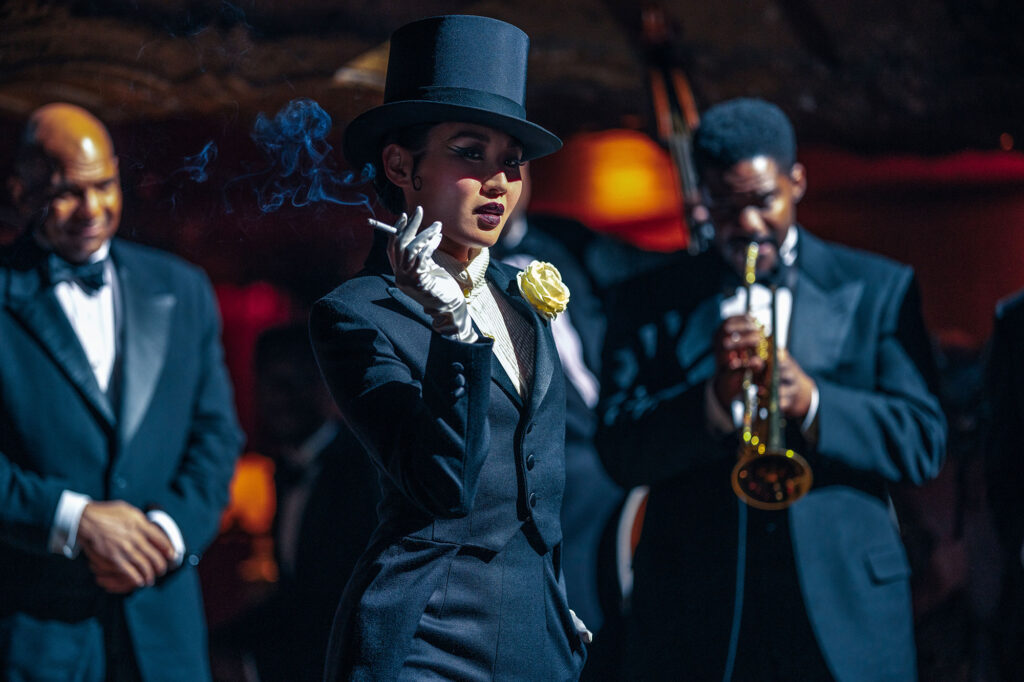
This spirit of graceful extravagance is most fully and thrillingly realized during Babylon’s boisterous, majestic first hour. That aforementioned elephant is one of the attractions at a sprawling, lavish party that takes place at the estate of wealthy mogul Don Wallach (Jeff Garlin), and which Chazelle captures in all its grotesque glory. Echoing a television namesake (Netflix’s Babylon Berlin), the gala is a veritable bacchanal, yet Chazelle and his crew drape the vice in velvet. The camera, operated by Linus Sandgren, glides through the decadence with impassive, anthropological detachment, moving fluidly as guests thrash on tabletops and copulate against walls. The jazzy score, by Justin Hurwitz, booms with jubilant precision, until it hushes when a tuxedoed foreign beauty, Lady Fay (Li Jun Li), serenades the awestruck crowd with a cooing rendition of the dirty ditty, “My Girl’s Pussy.”
Chazelle’s priority during this freewheeling, gargantuan sequence is tonal—he needs to convey the period’s glamorous joie de vivre, even as he recognizes the invisible laborers toiling behind the scenes—but he also quickly defines the film’s major characters. The man responsible for shepherding the elephant from the sun-baked California desert to Beverly Hills is Manny Torres (a very fine Diego Calva), a striving immigrant who longs for a career in the movie business. During the course of his distasteful duties (which involve discreetly transporting an unconscious guest, recalling a similar scene from Boogie Nights), Manny encounters Nellie LaRoy, an aspiring actress who shares his enthusiasm for motion pictures, and who arrives at Wallach’s party by crashing her (presumably stolen) sports car into one of the estate’s many statues. Manny instantly falls in love with Nellie, and it’s hard to blame him; wearing chunky boots and a revealing red dress whose fabric clings desperately to her body, she’s played by Margot Robbie in a performance of pure, boundless charisma.
Does Nellie have dreams of becoming a star, Manny wonders? “You don’t become a star,” she corrects him; “You’re either born a star or you’re not.” She would know. Robbie’s work in Babylon may not be the most technically accomplished turn of her career; there are glimmers of Harley Quinn peeking through her Jersey accent, and she doesn’t always dig under the character’s surface. But she pops off the screen, which is exactly what Chazelle requires. Yet the real discovery here is Calva, whose Manny stealthily becomes the movie’s brittle emotional soul and its thematic messenger. Whereas virtually everyone else in the film—including our third key player, Jack Conrad (a typically recessive Brad Pitt), a famous actor who gradually loses his grasp on the limelight—is motivated by pettiness or greed, Manny is a true believer in the magic of movies, which makes him both a naïve sap and a proxy for his director.
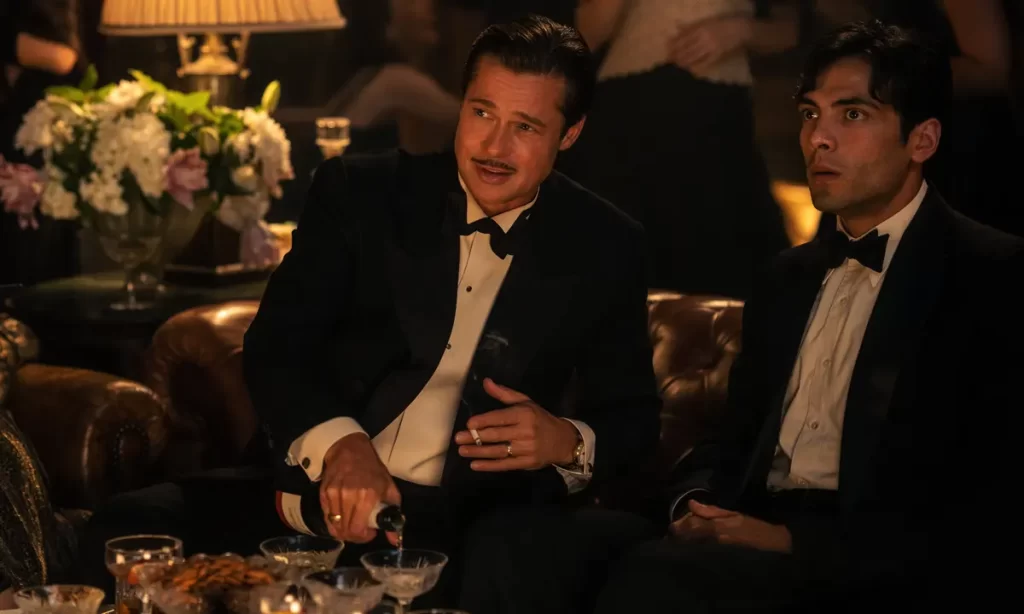
Chazelle’s affection for his art form animates Babylon’s second bravura set piece: a single day on the lot of the fictional Kinoscope Studios—which we first observe via one of Sandgren’s lithe, invigorating tracking shots—where he crosscuts between the hectic shooting of two very different pictures. Through a combination of decency and luck, Manny finds himself serving as Jack’s de facto handler, alternately acting as chauffeur, labor boss, and gofer; the last of those requires him to track down a replacement camera in order to placate an ornery auteur (an amusing Spike Jonze) in a race against the setting sun. Meanwhile, having been spotted at Wallach’s jubilee by a talent scout, Nellie earns a small part in a Western, and her brazen proclamations of her own stardom prove correct; she astounds her director (Olivia Hamilton, quite good), not only with her hypnotic swagger but with her uncanny ability to cry on command. Chazelle stages these complementary productions with feverish energy, culminating in a pair of buoyant, triumphant final shots. It’s spellbinding.
That he can’t sustain such energy indefinitely is inevitable—a natural consequence of both the film’s lengthy runtime (a never-boring 189 minutes) and its narrative trajectory. In a sense, Manny and Nellie’s arc mirrors that of Ryan Gosling and Emma Stone’s characters from La La Land: two undiscovered, passionate artisans who gain long-desired fame and success, only to struggle with how it impacts their relationships—with both their art and one another. (Coincidentally, this is the second movie in recent years where Robbie watches herself on screen in a crowded theater.) For his part, Jack’s sudden fall from public favor resembles a darker take on Jean Dujardin’s existential dilemma in The Artist—a beloved silent film star flailing to adapt to the medium’s seismic shift into talkies.
“Everything is about to change,” Manny gushes to Jack after witnessing the seminal premiere of The Jazz Singer. But while Jack muses that he needs “to redefine the form” of motion pictures, Chazelle is less interested in advancement than reflection; he wants to look back, not push forward. This carries its own pleasures, most notably during a delightful sequence where Nellie attempts to transmute her vivacious talents to the new era of clapboards and microphones, only for new problems to crop up—a missed mark, a ticking watch, a hilariously inopportune sneeze—with each successive take.
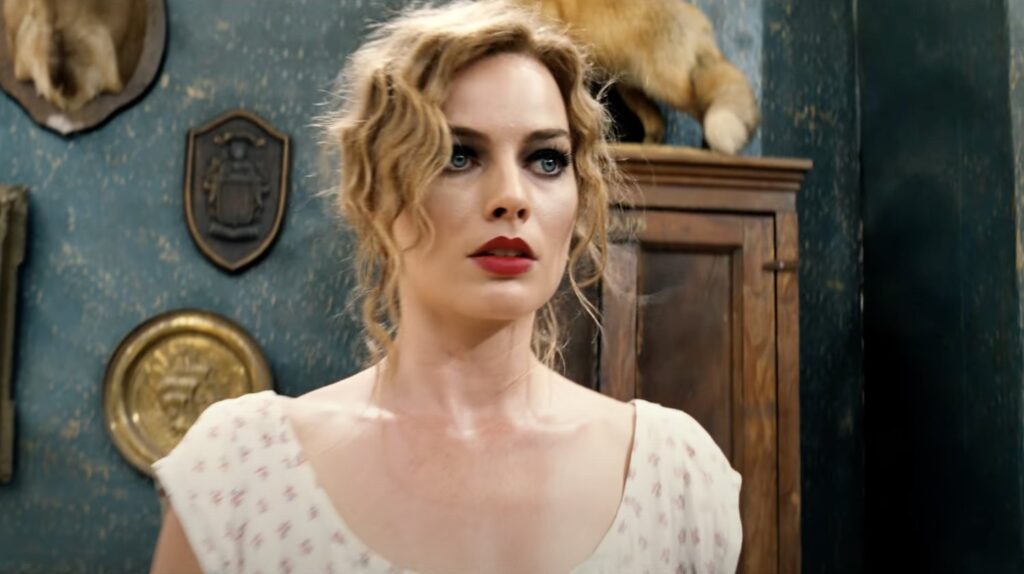
Yet where Chazelle’s depictions of artistic success are engaging and propulsive, his contrapuntal displays of failure are awkward and desultory. For hazy reasons, Nellie—whose newly heard voice is cruelly deemed to sound like a donkey—must wedge her way into Hollywood’s high society, resulting in a misguided scene where simpering elites mock her coarseness and low birth. (Cue the projectile vomiting.) It’s unclear what pernicious force these insufferable snobs are meant to represent—entrenched enemies of cinematic progress? highfalutin anti-populists? Sight & Sound voters?—but there’s a straw-man quality to their conception, as though Chazelle is defensively lashing out against ambiguous critiques of Real Movies.
Speaking of critiques, Babylon treats several secondary characters of color with a curious exoticism that is unlikely to placate the detractors who found the racial dimensions of La La Land and Whiplash unpalatable. Following an electric meet-cute (involving an angry rattlesnake, a sharp knife, and a charged kiss), Lady Fay becomes Nellie’s concubine, only to be unceremoniously dismissed because their association offends contemporary mores; it’s an affecting moment, made all the more powerful for how Chazelle lights it (mostly in shadow, with background curtains creating a haunting green hue), but it also contributes to the film’s sense of marginalization. The same is true of a trumpeter (Jovan Adepo) who functions as Manny’s meal ticket but is then profoundly humiliated, rendering him cipher as much as character.
Chazelle’s treatment here is at least defensible—less careless tokenism than a regrettably accurate reflection of the period’s casual, callous bigotry. Less justifiable is Babylon’s late swerve into ghoulishness. Rare is the picture that isn’t improved by the presence of Tobey Maguire, but despite some impressively revolting makeup (yellow teeth, sunken eyes), the actor’s arrival here sends the movie into its ugliest stretch, one that mistakes shock value for suspense and revels in pointless perversity.
So, sure, Babylon has its problems. Part of me wishes that it were less undisciplined and more sensible—that its numerous extraneous passages had been pruned, that its jolts of violence were less discordant, that its themes more snugly conjoined with its characters. But while exercising such restraint might have resulted in a better movie, it wouldn’t necessarily have been a more memorable one.
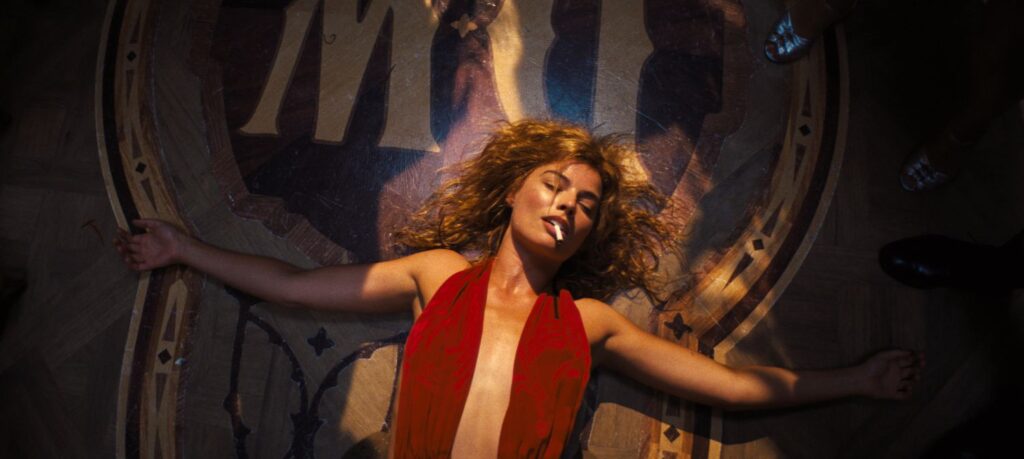
Which, I suspect, is Chazelle’s real point. As an original work, Babylon is imperfect but noteworthy—not just for its towering craft, but its unabashed sincerity. In its excessive and eccentric details, it is ridiculous, collapsing the distinction between obscenely entertaining and genuine obscenity. Yet in its forthright earnestness, it is deeply serious, maybe even square. Even as it desecrates the consecrated ground of old Hollywood, it mounts an ardent argument in favor of the industry’s continued vitality.
I’m not speaking metaphorically. At one point in Babylon, a gossip columnist played by Jean Smart reassures a reeling Jack of the strength of his legacy, explaining that while his career may be moribund, new viewers will continue discovering his work long after his death. It’s possible to read the scene as self-aggrandizing, but Chazelle’s writing is too heartfelt to come off as smug. And while the entire exchange—really, the entire picture—is shamefully didactic and woefully unsubtle, in a time of flagging box-office receipts and imperiled adult-oriented films, Chazelle’s tools of bluntness and vigor feel commensurate to the fight at hand. He loves movies, and he wants you to love them too.
This is hardly novel territory; hell, in the past month alone we’ve seen two other titles—Steven Spielberg’s The Fabelmans and Sam Mendes’ Empire of Light—wax poetic about the enduring power of the silver screen. But Babylon is far more enjoyable than the latter, and while it certainly lacks the nuance of the former, that’s in part because Chazelle’s unfettered profligacy leaves little room for delicacy. This is most apparent during the film’s maniacal finale, an enormous swing in which Chazelle first exhibits the gall to equate his own output with a treasured ’50s classic, then goes beyond and delivers a keening tribute to the entire history of the medium. Does it work? I’m not sure. But it tries awfully hard, and Babylon’s audacity is ultimately its own reward. It isn’t quite a great movie, but its frequent moments of sublimity remind us of the value of cinematic greatness.
Grade: B+
Jeremy Beck is the editor-in-chief of MovieManifesto. He watches more movies and television than he probably should.
